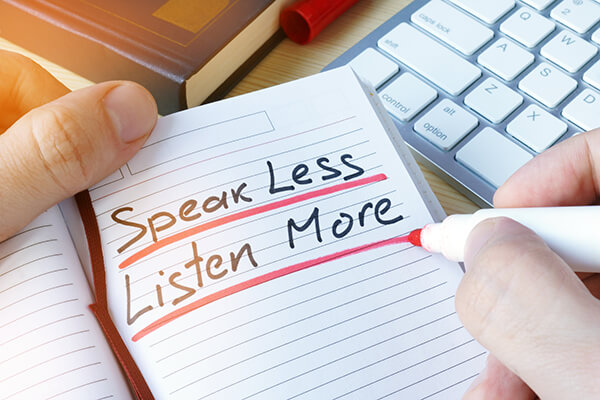
“People will forget what you said, people will forget what you did but they will never forget how you made them feel.” Maya Angelou is writing about the power of feeling valued and heard. Are you a good listener? Many books on relationships will begin with the idea that “the first duty of love (kindness) is to listen”. Experts teach us that using effective listening skills builds and improves working relationships, provides information necessary for improved decision making, diffuses potential conflicts and generates new ideas and solutions.
You may not naturally be an effective listener however it is a skill that can be developed. You can learn to pay better attention to others and listen to understand by following a few simple rules. As you read through the list below, what can you pay closer attention to in order to help this Thanksgiving be a feast of listening and kindness?
One of the best articles I have ever read on the topic of listening was found long ago, written by training consultant Cathie Mokry. Listed are some of her suggestions:
- Focus completely on the speaker. This requires effort since our thinking speed (400-600 words per minute) exceeds our talking speed (125-150 words per minute). Resist the temptation to dwell on your internal thoughts. Keep your concentration on the message being conveyed by the speaker. Thinking more about ourselves instead of what is being said is the greatest obstacle to effective listening.
- Create a comfortable environment between you and the speaker by noting your facial expressions and body language. Stay relaxed. You may think you are paying attention but your expression may be saying the exact opposite.
- Be curious by being open minded. Allow others to have different ideas and opinions. The goal isn’t to convince them that your way is the right way but to have meaningful connection.
- Seek clarification on your conversations. Briefly summarize or paraphrase what you think you heard and provide the opportunity to clear up any misunderstanding. A good way to do this is simply by saying: “Is that what you meant? Did I understand you correctly?”
- Use open ended questions to encourage the speaker to share more. If you are the only voice you hear in the conversation, you are talking too much.
- Listen for the feelings as well as facts. It enhances the quality of the conversation.
- Take a few seconds to really figure out what you want to say. Thoughtful consideration before you reply conveys respect for the message and the messenger.
If you want to learn more about improving your communication patterns, relationships or would like a professional counselor to listen to you, please contact the Methodist Healthcare EAP at 901-683-5658 for free, confidential counseling for you and your household members.
 Susan Erdman has a master's degree in pastoral studies from Loyola University in New Orleans and a master’s degree in social work from the University of Tennessee in Memphis. She has worked as an EAP counselor since the 1990s. Before her work in the EAP, she was a mental health specialist at Methodist University Hospital in the eating disorder and dual diagnosis programs.
Susan Erdman has a master's degree in pastoral studies from Loyola University in New Orleans and a master’s degree in social work from the University of Tennessee in Memphis. She has worked as an EAP counselor since the 1990s. Before her work in the EAP, she was a mental health specialist at Methodist University Hospital in the eating disorder and dual diagnosis programs.
